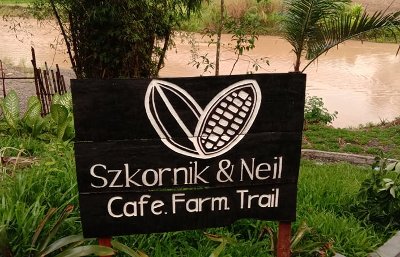Some good things come out of a pandemic. Such is the case of Szkornik and Neil, a farm-café carved by the hills of Igbical in Hamtic town, south of Antique. Barely two weeks after it formally opened to the public, the café is now turning down walk-ins, limiting their daily reservations to only 25 guests. May it be a snob-appeal strategy to rouse the curiosity of the hoi polloi forever seeking instagrammable spots, or in observance of the pandemic protocols, it surely is working to their advantage, and boosting Antique’s claim to being tourism’s rising star in the region.
Szkornik and Neil literally popped out of the pandemic, opening even as the country is still shuffling ECQ, GCQ, MECQ, and many more acronyms to euphemize the lockdown, amidst the confusion, illusion, and delusion brought by Covid-19 to the country. The sprawling property that can be reached only after many twists and turns off Route 501, the national highway connecting Iloilo to Boracay through Antique, offers tranquil bliss, far from the madding crowd – a cliché, yes, but a welcome one nevertheless. Its story is inspiring.
Owner Neil Turrecha-Huele has been doing good business exporting seaweeds to China and Vietnam since 2017, a venture he started after stints in Malaysia and Singapore. But the lockdown in March caught him totally unprepared, and he was forced to stay in his hometown Hamtic. Perhaps, for good reason. He found himself organizing online farm markets to help the farmers sell their produce, and raising money for rice distribution. With much time in his hands, he started working on a project with his boyhood buddy Szkornik from nearby Dangcalan village, who is now based in UK, and couldn’t come home after airports worldwide have closed: to build a chilling place in a property they have acquired back in 2016.
The 15.5-hectare property is cut by the winding Hamtic River on one side, and bordered by a steep hill on the other. He started building his dream bahay kubo: a house on stilts with a verandah that opens to a panoramic view of the river. The roof is of locally sourced wrought anahaw leaves, pitched high typical of Asian houses. The inspiration is of Bali, Neil’s favorite hideaway. He wants to keep the surroundings as close to its natural landscape. Next, he built by the river bank an open café with thatched cogon roof. Friends came in, wanting to chill and laze around; the next step was to build a kitchen so they could offer food.
Two months into the lockdown, Neil reported to buddy Szkornik, that they have built not the treehouse of their childhood dream, but a café in a farm. He and his staff planted vegetables that they could use in their menu: lettuce, moringa, lemongrass, kangkong, ampalaya. Inspired by a ginger-flavored lemon tea in Vietnam, Neil concocted signature drinks like the batwan cooler, lemon-moringga and berries and lemongrass teas now in their beverage list.
Their menu is as cosmopolitan as any other city café. At prices averaging 300 pesos (6 USD) per item, it is prohibitive by Antique standards, let alone a café by the mountains offering a dish like beef bourguignon. One might find the puttanesca a tad sweet, perhaps adjusted to local taste, but Neil is modest enough to admit they are still struggling in the kitchen. After all, they are not really restaurateurs or culinary experts, neither are they yearning for Michelin stars, but they have been around the globe. “We may not be able to offer the best foods, but we make sure it is good food,” he defends. To ensure the freshness, they do marketing on a daily basis, but for meat that needs longer preparation, they buy the day before and at quantities enough for guest orders. That also explains why they prefer guests who have made reservations.
They have become a popular destination for bikers who take the hilly route in the morning to end up with a good breakfast. They also cater to trekkers and campers. An uphill trail has been designed for the more adventurous, and tents can be pitched by the riverside for glamping. They also offer a karosa – a carabao-drawn sled – ride by the riverbed. The in-house mascot is Nala, a 10-month old Kangal, a popular shepherd dog from Turkey. Six other dogs, including a Belgian malinois, a German shepherd, and a rottweiler help keep trespassers and poachers from the property. Obviously a pet lover, Neil levels up his game by adopting two tigers from a zoo whose operation was affected by the pandemic. They are fencing off a thousand square meters in the property to let the tigers roam freely; the first is arriving soon, the other arriving by yearend.
Despite the setback in his export business, Neil has found in the pandemic a chance to come home and live his childhood dream. The Szkornik and Neil story is like a pop-up book that delights the readers as they open every page. Yet this is only the Neil part; the world is yet to read Szkornik’s.











